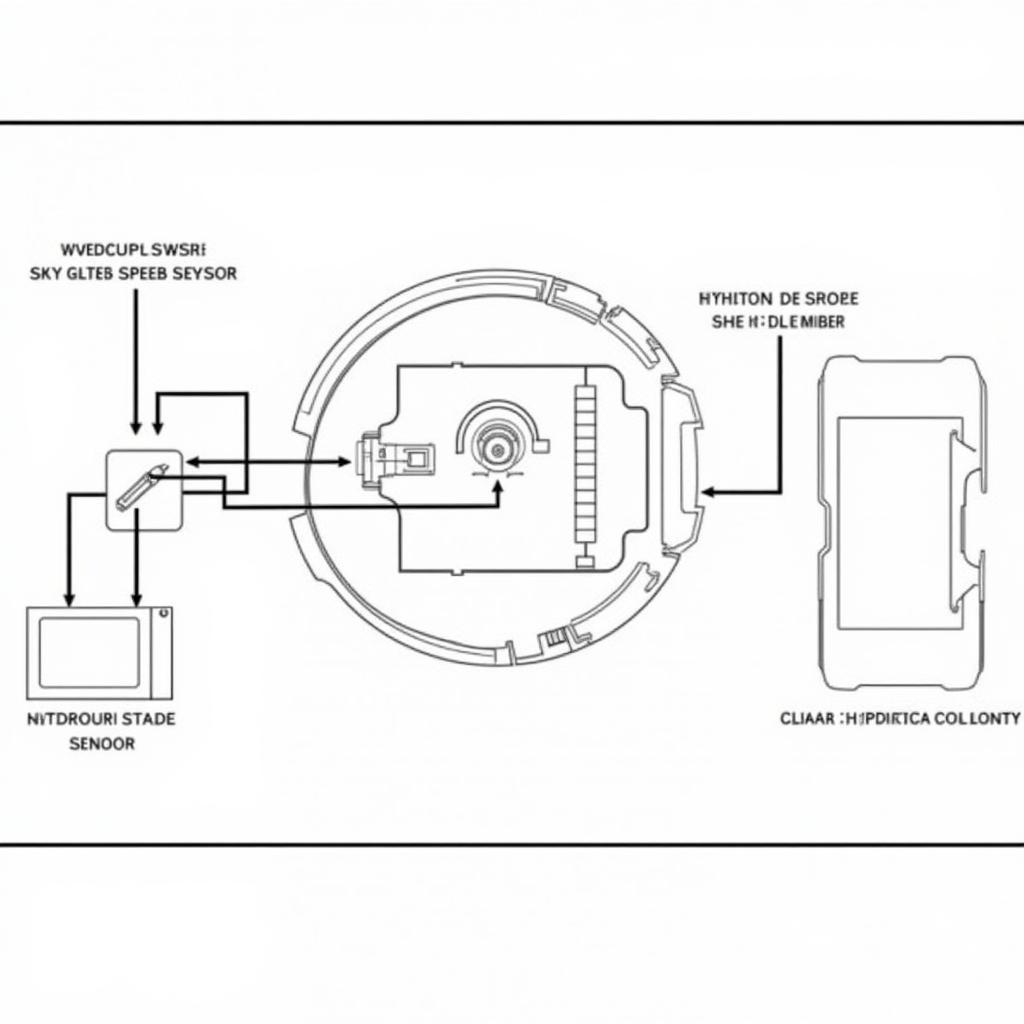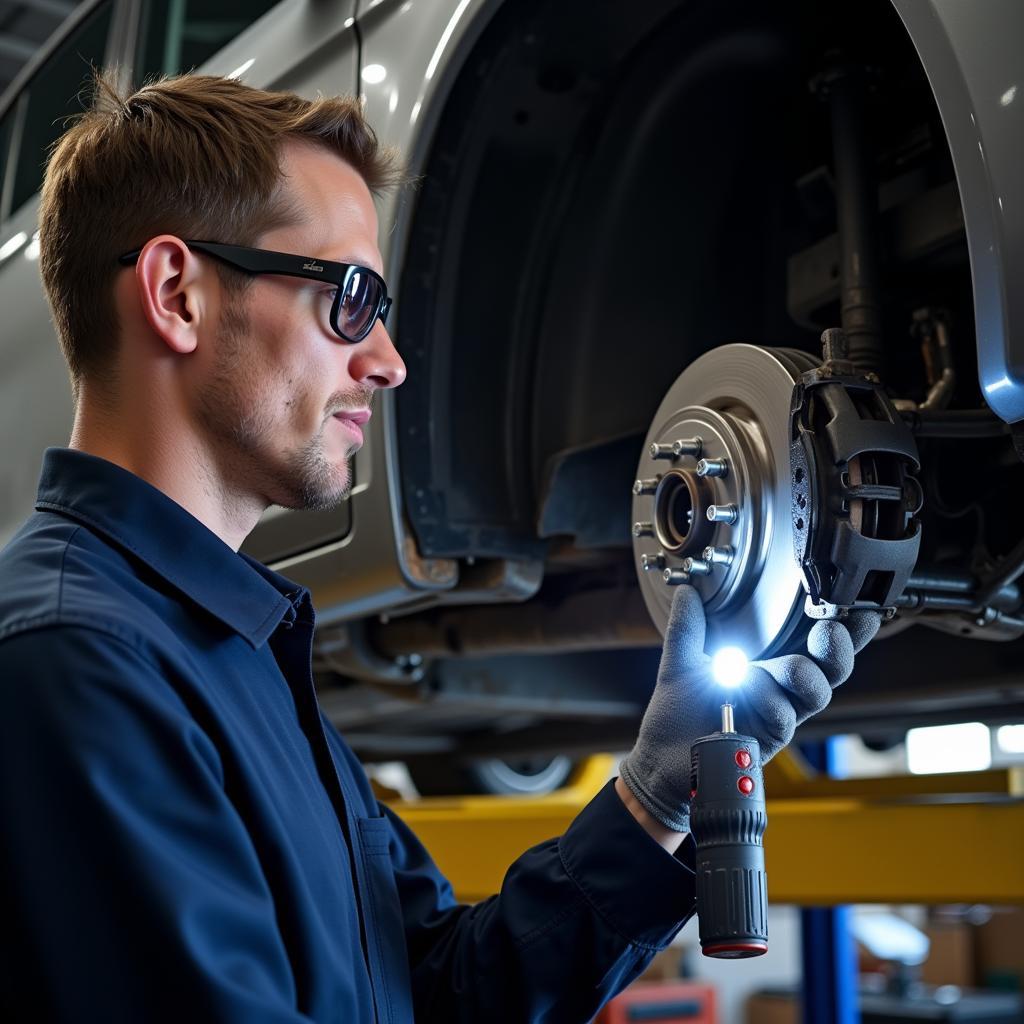You turn on your car, and there it is: the dreaded anti-lock brakes warning light. It refuses to budge, even after you start driving. A wave of panic might set in, but before you assume the worst, take a deep breath. This situation, while concerning, is often manageable. This article will guide you through the possible causes and what actions you should take when your anti-lock brakes warning light insists on staying on.
Understanding the Anti-Lock Brake System (ABS)
Before we dive into the reasons behind a persistent warning light, it’s crucial to understand the role of your car’s ABS. The ABS is a crucial safety feature designed to prevent your wheels from locking up during hard braking. This function helps you maintain steering control and significantly reduces the risk of skidding.
 Car ABS System Components
Car ABS System Components
Common Causes of a Persistent ABS Warning Light
While a temporary flicker of your ABS warning light during startup is normal, a constant glow signals a potential issue within the system. Here are some of the most common culprits:
- Faulty Wheel Speed Sensors: These sensors, usually located near the wheels, monitor wheel speed and relay this information to the ABS control module. A malfunctioning sensor can disrupt this flow of information, triggering the warning light.
- ABS Control Module Issues: The ABS control module acts as the brain of the system. If this module experiences electrical faults or malfunctions, it can lead to a persistent warning light.
- Low Brake Fluid Level: Your ABS system relies on adequate brake fluid pressure to function correctly. Low brake fluid, often a symptom of a leak, can also trigger the warning light.
- Hydraulic System Problems: Problems within the ABS hydraulic system, such as worn components or internal leaks, can also disrupt the system’s operation and trigger the warning light.
What You Should Do When Your ABS Warning Light Stays On
A glowing ABS warning light should never be ignored. Here’s a step-by-step guide on how to address the issue:
- Safety First: Find a safe location to pull over and assess the situation. Avoid heavy traffic areas.
- Check Your Brake Fluid: Carefully open the brake fluid reservoir (refer to your owner’s manual for location). If the fluid level is low, there might be a leak.
- Visual Inspection: While a visual inspection might not always pinpoint the problem, it’s worth checking for any visibly damaged wires or components around the wheels and brake lines.
- Avoid Driving (If Possible): If you suspect a serious issue, especially if the ABS warning light is accompanied by other warning lights or unusual braking behavior, it’s best to avoid driving and have your vehicle towed to a trusted mechanic.
 Mechanic Checking Car Brake System
Mechanic Checking Car Brake System
Remote Diagnostics and Repair: The Future of Car Maintenance
In our increasingly digital age, remote diagnostics and repair services are changing the automotive landscape. These services offer a convenient and efficient way to address car issues, including those related to the ABS system.
How Remote Diagnostics Work:
- Connecting to Your Car: With specialized equipment and software, technicians can access your vehicle’s onboard computer remotely.
- Retrieving Diagnostic Trouble Codes (DTCs): By reading the DTCs stored in your car’s computer, technicians can quickly pinpoint the root cause of the ABS warning light.
- Remote Programming and Software Updates: In some cases, a software update or reprogramming of the ABS control module might be necessary, which can often be done remotely.
vw brake warning light stays on
Benefits of Remote Diagnostics and Repair
- Convenience: Skip the trip to the mechanic and have your car diagnosed and potentially repaired from the comfort of your home.
- Speed and Efficiency: Remote diagnostics can often identify problems faster than traditional methods, saving you valuable time.
- Cost Savings: In many cases, remote diagnostics can be less expensive than traditional in-shop diagnostics.
mazda cx 5 grand touring brake warning lights
When to Seek Professional Help
While remote diagnostics offer a convenient solution, some situations require the expertise of a qualified mechanic.
- Physical Repairs: If the diagnostics reveal a mechanical issue, such as a faulty wheel speed sensor or a brake fluid leak, a mechanic will need to physically repair or replace the component.
- Complex ABS Issues: While remote diagnostics can handle many ABS problems, highly complex issues might necessitate in-depth, hands-on diagnosis and repair.
what do 2011 altima nissan altima brake warning lights mean
“Remote diagnostics can often identify the problem and even guide car owners on simple fixes they can do themselves,” says John Smith, Senior Automotive Engineer at XYZ Auto Solutions. “It’s revolutionizing how we approach car maintenance.”
Conclusion
A persistent ABS warning light is a clear indication that something is amiss with your car’s braking system. While it can be tempting to dismiss it as a minor glitch, ignoring it could compromise your safety on the road. By understanding the potential causes, taking appropriate immediate actions, and considering the benefits of remote diagnostics, you can address the issue effectively and ensure the continued safety and performance of your vehicle.
FAQs
Q: Can I drive my car with the ABS warning light on?
A: While you might still have regular braking functionality, it’s strongly advised to avoid driving. The ABS system is disabled when the light is on, increasing the risk of wheel lock-up during hard braking.
Q: Is it expensive to fix an ABS problem?
A: The cost can vary greatly depending on the root cause. A faulty wheel speed sensor might be relatively inexpensive to replace, while an ABS control module replacement can be more costly.
Q: How often should I have my ABS system checked?
A: It’s a good practice to have your entire brake system, including the ABS, inspected annually or as recommended in your car’s owner’s manual.
Q: Can I fix my ABS system myself?
A: While some car maintenance tasks can be done at home, ABS-related repairs often require specialized knowledge and tools. It’s best to leave these repairs to qualified professionals.
Q: How can I prevent future ABS problems?
A: Regular brake system inspections, maintaining the correct brake fluid level, and addressing any brake-related issues promptly can go a long way in preventing future ABS problems.
